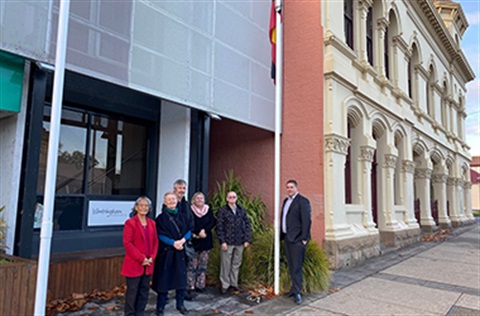Reconciliation Week 2022
Published on 27 May 2022

This morning Councillors and staff raised the Aboriginal flag at the Creswick Hub to mark the beginning of National Reconciliation Week 2022.
The theme for Reconciliation Week this year is Be Brave. Make Change. There is a call for all Australians – individuals, families, communities, organisations, and government – to be brave and tackle the unfinished business of reconciliation so we can make change for the benefit of all Australians. Find out more about National Sorry Day and Reconciliation Week.
The Mayor made this speech at the flag raising event.
National Reconciliation Week 2022 Speech
Mayor, Cr Tim Drylie
Reconciliation is about strengthening relationships between Aboriginal and Torres Strait Islander peoples and non-Indigenous peoples. On this DJAARA land we are on today it is about paying respect, working together and alongside Dja Dja Wurrung people, being brave and empowering positive changes to tackle the unfinished business of reconciliation and First Nations self-determination.
Reconciliation is an ongoing journey that reminds us that while generations of Australians have fought hard for meaningful change, future gains are likely to take just as much, if not more, effort.
Australia’s colonial history is characterised by First Nations land dispossession, attempted genocide, and racism. Despite this Aboriginal and Torres Strait Islander people have managed through their own resilience to continue to nurture culture and connections with country. And over the last half-century, many significant steps towards reconciliation have been taken.
National Reconciliation week happens on the 27 May to 3 June. These dates commemorate two significant milestones in the reconciliation journey— the successful 1967 referendum, and the High Court Mabo decision respectively.
The National Reconciliation Week 2022 theme, “Be Brave. Make Change.” is a challenge to all Australians— individuals, families, communities, organisations and government—to Be Brave and tackle the unfinished business of reconciliation so we can Make Change for the benefit of all Australians.
Part of the challenge of reconciliation is that an agreement on its correct and proper path is not unanimously apparent. Concerns remain for some First Nations and non-indigenous people alike about how priorities and promises have been made, what actions have or have not been taken and how people are engaged, and who has been included in or excluded from these discussions.
Most recently we have seen a positive shift federally to embrace the Uluru Statement of the Heart which aims to establish a First Nations Voice to Parliament enshrined in the Constitution, and the establishment of a Makarrata Commission for the purpose of treaty making and truth-telling.
For some however reconciliation is more simply about a need to pay the rent owed to First Nations people directly. That sovereignty to the land, sea and air was never ceded by Aboriginal people in the first place and is still therefore and always will be Aboriginal people’s land. Every day, we consume food grown on Indigenous land, live in houses built on indigenous land and enjoy the benefits that flow from this opportunity. Paying the rent is a step towards acknowledging our debt to First Nations peoples and the harm that has been caused to their continuing health and wellbeing.
Self-determination for indigenous people plays a big role in the recently released Victorian Aboriginal and Local Government Strategy 2021 – 2026. It states that the Victorian Government knows Aboriginal Victorians are best placed to make decisions for themselves, their families, and their communities. The document also acknowledges that all levels of government must change the way they work and engage with Aboriginal people. It identifies the four enablers needed to achieve self determination and they are: Prioritise Culture; address trauma and healing; Address racism and promote cultural safety; transfer power and resources to Aboriginal communities. The Hon. Gabrielle Williams Minister for Aboriginal Affairs states the ‘Strategy values and emphasises shared roles and responsibilities, and the need for partnerships between local government and Aboriginal Victorians based on sharing, listening, care, trust, truth-telling and understanding’.
I’m proud to say that our own Hepburn Shire Council has demonstrated its commitment to Reconciliation through developing a close working relationship with DJAARA, creating a dedicated Reconciliation Officer role and developed a Reconciliation Action Plan in partnership with Traditional Owners and other community stakeholders.
There have been several outstanding reconciliation projects in the past couple of years including the innovative Manna Gums Frontier Wars Memorial. Hepburn has also been the lead organisation in undertaking a community education and engagement process leading to a formal recommendation to Geographic Names Victoria to rename the Jim Crow Creek to Larni Barramul Yaluk, in line with the wishes of representatives of the Traditional Owners, the Dja Dja Wurrung.
Hepburn Shire will commence the development of its second Reconciliation Action Plan in the second half of this year, guided by a new Reconciliation Advisory Committee. Information about how to express interest in joining the Committee will be made available in the next couple of months
This reconciliation week, I encourage you all to reach out, get involved at one of our shire libraries events, be brave and make change in your own spheres of influence for the benefit of all Australians, but foremost for First Nations peoples. I particularly enjoyed going online to listen and learn from Dja Dja Wurrung elder Uncle Rick Nelson talk about his and his community’s experiences and history locally.